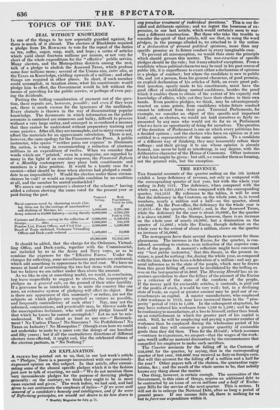AN EXPLANATION.
A FRIEND has pointed out to us, that, in our last week's article on "Pledges," there is a passage inconsistent with our previously- expressed opinion on this subject. In that article, after enume- rating some of the absurd specific pledges which it is the fashion just now to talk of exacting, we said—" We do not mention these 'very inconsiderate pledges for the purpose of decrying pledges generally on the contrary, we think they ought to be in most cases exacted and given." The week before, we had said, and had given to our sentiments the emphasis of italics—" If we were well assured of a candidate's honesty and intelligence, and if he were -of Reforming principles, we would not desire to tie him down to • Monthly Magazine for July, p.71. any peculiar treatment of individual questions." This is our de- cided and deliberate opinion; and we regret the looseness of ex- pression, in our last article, which would certainly seem to war- rant a different construction. But those who take the trouble to consider the spirit of that article, will see that, in using the word pledges, in the passage alluded to, we attached to it the notion of a declaration of present political opinions, more than any Specific promise as to future conduct in every imaginable case. To prevent all misconception, we would thus state the principle which should govern this matter. The non-exaction of specific pledges should be the rule; but it may admit of exceptions. From a candidate whose political character may be read in his past course of public life, it is superfluous to exact either a declaration of opinions or a pledge of conduct; but where the candidate is new to public life, and yet a person, from his general character, of good promise, an explicit declaration of his articles of faith, on every great poli- tical question, openly made to his constituents, must have the good effect of establishing mutual confidence, besides the proof which it enables them to obtain of the extent of his capacity and knowledge of affairs, while yet they have their choice in their own hands. Even positive pledges, we think, may be advantageously exacted on some points, from candidates wlictse future conduct cannot be inferred from their past. Triennial Parliaments, for example, we consider an object of this specific and important kind ; and, as electors, we would not hold ourselves as fairly re- presented by any man who would not do for us in Parliament what we have no opportunity of doing for ourselves. The question of the duration of Parliament is one on which every politician has a decided opinion ; and the electors who have an opinion on it are entitled to a representative of the same opinion. To a candidate of a different way of thinking, they may reasonably refuse their suffrage ; and their giving it to one whose opinion is already formed, can never be held as interfering, -in any degree, with the deliberative character of the House of Commons. Other instances of this kind might be given ; but still, we consider them as forming, not the general rule, but the exception.


























 Previous page
Previous page